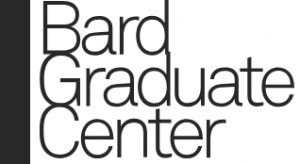Bard Graduate Center Research Fellowship
“Whose story?”
Bard Graduate Center invites scholars from university, museum, and independent backgrounds with a PhD or equivalent professional experience to apply for funded research fellowships, to be held during the 2019–20 academic year. The theme for this period is “Whose story?” Applicants are asked to address in a cover letter how their projected work will bear on this question. The fellowships are intended to fund collections-based research at Bard Graduate Center or elsewhere in New York, as well as writing or reading projects in which being part of our dynamic research environment is intellectually valuable. Eligible disciplines and fields of study include—but are not limited to—art history, architecture and design history, economic and cultural history, history of technology, philosophy, anthropology, and archaeology.
The stipend rate is $3,500 per month, and housing is available. Fellowships are available for a period of 1 to 6 months. The timing of dates will be negotiated with individual awardees. Fellows will be given a workspace in our Research Center at 38 West 86th Street, between Columbus Avenue and Central Park West, in New York City.
Bard Graduate Center is a graduate research institute devoted to the study of the decorative arts, design history, and material culture, drawing on methodologies and approaches from art history, economic and cultural history, history of technology, philosophy, anthropology, and archaeology. Our MA and PhD degree programs, Gallery exhibitions, research initiatives, and public programs explore new ways of thinking about the cultural history of the material world. We possess a specialized library of 60,000 volumes exclusive of serials and publish the journals West 86th: A Journal of Decorative Arts, Design History, and Material Culture and Source: Notes in the History of Art, the book series Cultural Histories of the Material World (all with the University of Chicago Press), and the catalogues that accompany the exhibitions presented every year in our Gallery (with Yale University Press). Over 50 research seminars, lectures, and symposia are scheduled annually and are livestreamed around the world on Bard Graduate Center’s YouTube channel.
To apply, please submit the following materials electronically via email to fellowships@bgc.bard.edu in a single PDF file:
- BGC fellowship application form;
- cover letter explaining why Bard Graduate Center is an appropriate research affiliation and how your work bears on the question “Whose story?”;
- 150-word abstract of project;
- detailed project description;
- CV;
- publication or academic writing sample of approximately 20–30 pages.
In addition, please arrange for two letters of reference to be submitted either via email (fellowships@bgc.bard.edu) or post (to Bard Graduate Center, Research Fellowship Committee, 38 West 86th Street, New York, NY 10024). All materials must be received by November 1, 2018. Incomplete or late applications will not be considered. Please direct questions to the Research Fellowship Committee via email (fellowships@bgc.bard.edu) and see our Frequently Asked Questions page.
We do not reimburse fellows for travel, relocation, or visa-related costs in connection with this fellowship award. Also, please note that the fellowship stipend and the value of the provided housing may be subject to taxes for both US citizens and non-US citizens in accordance with US tax code. Fellowships are awarded without regard to race, color, gender, religion, national origin, sexual orientation, age, or disability.
2019–20 theme “Whose story?”
“History” is one of those everyday terms that is a lot harder to analyze than it is to use. Does it refer, for instance, to what happened in the past or to the means—in fact, to only one of the means—developed for recounting what has happened in the past? How related is “history” to writing? What is the relation of the person to the past? Can there be a history of the present? On the one hand, it is, precisely, not yet past and on the other, between the beginning of this sentence and its end the present has, in fact, become the past. These are big questions, though usually not questions that scholars of the past spend much time on, assuming as they do that they are all solved.
The research theme for 2019–20, “Whose story?” focuses on another of these basic questions (following upon distance and period). Who makes history? Who writes history? Who, if anyone, owns the history that is made or the history that is written? If distance makes history possible, it also suggests that history is somehow the realm of the objective and dispassionate. In fact, history is a fiercely contested battlefield; sometimes it seems like a landscape strewn with minefields that detonate each in their own time, and sometimes it is a landscape shaped by contentiousness from the very start.
And then there is the question of “story” itself. This might be another one of the aspects of history that is more assumed than understood. For students of things, story stands in a particularly complex position. Right at the very beginning of a formalization of historical scholarship that actually made space for things, Francis Bacon in The Advancement of Learning distinguished history written from written sources from history written from things, and “from passages of books that concern not story.” Lists, inventories, fragments, genealogies, inscriptions—none of these things were stories, but they made it possible to write stories about the past. The very recent “material turn” has been marked by efforts to imagine the “biographies of objects” as if things had stories.
If we put the “whose” and the “story” together we are in a position to ask yet another question, about the politics of things and the way in which no story is without an inclusion that is also necessarily an exclusion.
